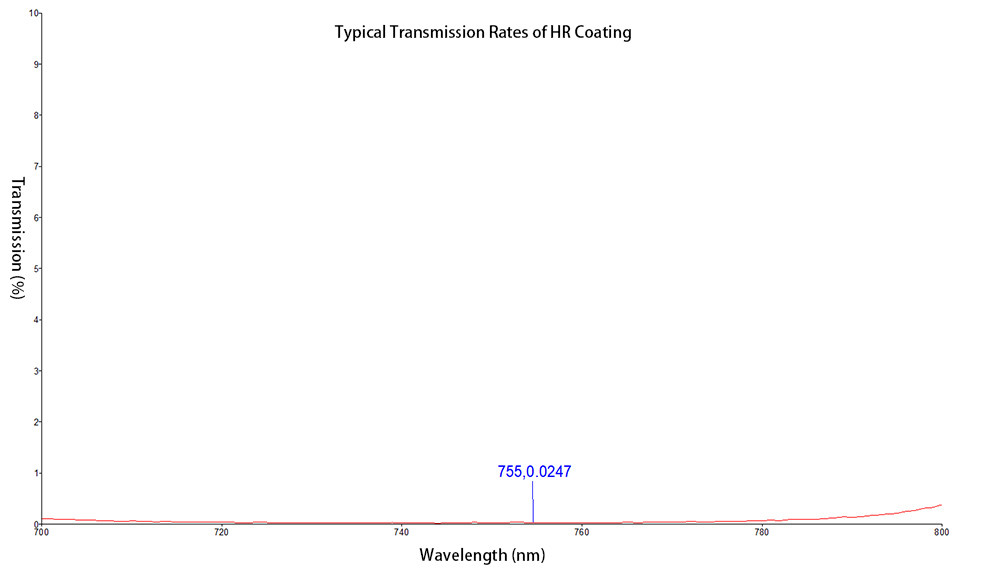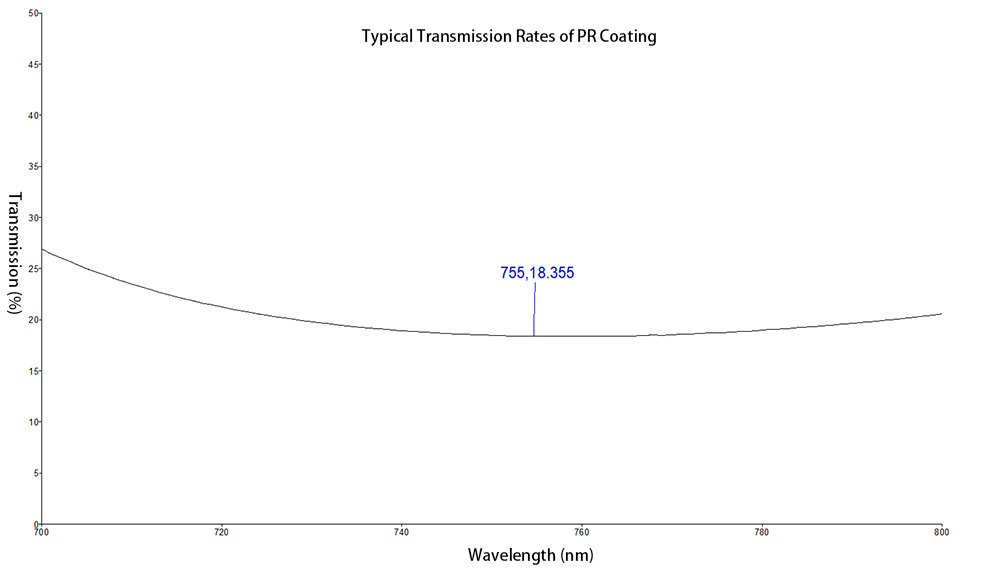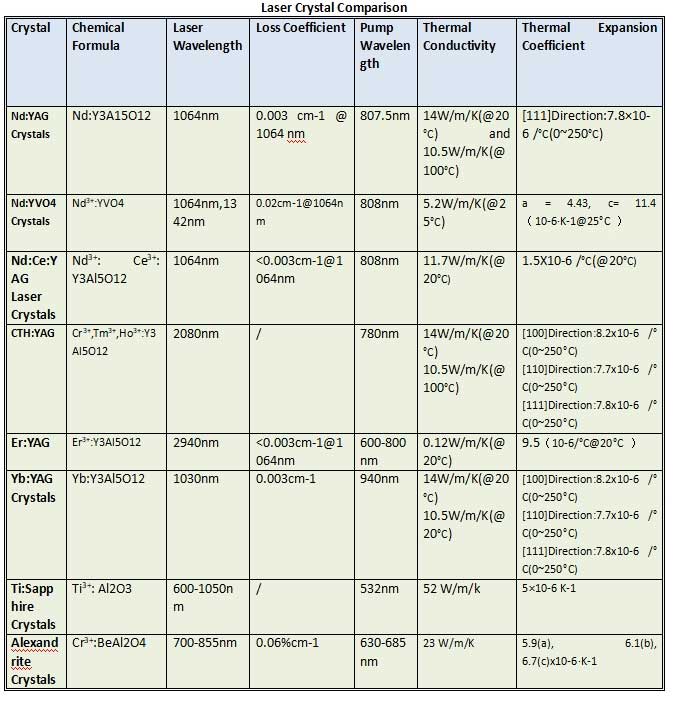Typical modules:
Dia5x115mm, Dia7x110mm, Dia7x125mm
Dia6.35x120mm, Dia8x130mm, Dia9.53x117mm
Specifications:
| Size Tolerance | Diameter (+0/-0.05 mm) x Length (+1/-0 mm) | ||
| Surface Quality | 10/5 S/D | Parallelism | <10” |
| Allowed Chips | <0.1mm | Perpendicularity | <5' |
| Flatness | λ/10@633nm | Clear Aperture | ≥98% |
| Coating Options | 1- Normal : AR@755nm on both ends 2- Mirror coating: HR@755nm(S1) & PR@755nm(S2) | ||
| Optional End Forms of Rod | 1- Plano-Plano 2- Convex-Plano | ||
| Damage Threshold | > 1.5 Million pulses ( tested by third party) | ||
Material Properties:
| Formula | Cr3+:BeAl2O4 |
| Lattice Constants (Angstrom) | 5.476(a) x 9.404(b) x 4.427(c) |
| Molecular weight | 127.01 g/mole |
| Hardness (Mohs) | 8.5 |
| Laser wavelength | 700 - 855nm |
| Pump wavelength | 630 - 685nm |
| Intrinsic Loss | 0.06%cm-1 |
| Crystal System | Orthorhombic |
| Refractive Index (@750 nm) | 1.7367(a) x 1.7241(b) x 1.7346(c) |
| Thermal Expansion Coefficient (x 10^-6/K) | 5.9(a), 6.1(b), 6.7(c) |
| Vickers Hardness(kg/mm^2) | 2000 |
| Melting Point | 1870 °C |
| Thermal Conductivity | 0.23 W/cm•K |
| Density | 3.7 g/cm^3 |
| Young's Modulus (GPa) | 469 |
| Thermal Shock Resistance (W/cm) | 35 - 74 |
| dn/dT | 8x10^-6/K |
Alexandrite (chromium-doped beryllium aluminate, Cr3+:BeAl2O4) is a kind of crystalline laser gain medium grown in monocrystalline form using the improved Czochralski method, and the laser-active Cr3+ ions are doped in the host crystal. Alexandrite laser crystal is capable of generating a wide range of wavelengths, a tuning range of 710nm to 800nm is possible under optimum operating conditions. The most prevalent wavelength is around 755nm, where maximum efficiency could be attained. Alexandrite laser crystal is a topical material in the current market for applications in various industrial fields including Dermatology, Atmospheric Lidar, or Spectroscopy (which exploits the wavelength tunability of Alexandrite), etc. And is advantageous for Medical Laser Devices (e.g. Hair Removal Lasers). In addition, attributing to an anisotropic structure, combined with its significant birefringent property, it is possible to achieve light emission of linear polarization of low depolarization loss with an Alexandrite laser.
Shanghai Shalom offers customized Alexandrite laser crystals favorable for 755nm long pulsed, Q-switched, or picosecond lasers, with high damage threshold, high thermo-optical quality, and competitive price. We also provide refurbishing services (re-polishing and re-coating for used laser rods). In addition, You could get the complementary DKDP 755nm Pockels Cells for your Alexandrite laser in North Optics, fast delivery is guaranteed for your requirements.
Features and applications of Alexandrite Laser Crystal:
Alexandrite not only endures high temperatures but even achieves higher laser gain and efficiency under elevated temperatures. The Alexandrite provided possesses excellent thermo-mechanical and thermo-optical properties. Compared to Nd:YAG, the thermal shock resistance of Alexandrite is five times higher.
The Alexandrite rod provided by North Optics has a high damage threshold that enables the rod to withstand > 1.5 million pulses.
Shanghai Shalom offers customized Alexandrite laser crystals favorable for 755nm long-pulsed, Q-switched or pico second lasers, you could also get the DKDP 755nm Pockels Cells in North Optics. This wavelength could be thoroughly absorbed by the hairs as well as melanin, making it favorable for aesthetic laser systems.
In the case of hair removal, an Alexandrite laser is a better choice than a diode laser for people with lighter skin, however for people with dark skin tone diode laser might be the only option since Alexandrite laser has a higher potential to cause damage to darker skin. Comparing to Nd:YAG laser, the Alexandrite laser is advantageous for people with lighter hair, and in terms of tolerability, it is generally found to be less painful than the Nd:YAG.
Tattoos can be removed by applying light which can be absorbed by the used ink, which is then chemically transformed and subsequently removed by the body. Q-switched short pulse Alexandrite laser is favorable for small ink particles.
1. Absorption Curves of Alexandrite Crystals

2. Transmission Curves of High Reflection and Partial Reflection Coatings for Alexandrite Rods
1). Typical Transmission Rates of High Reflection (HR) Coatings

2). Typical Transmission Rates of Partial Reflection (PR) Coatings

Laser Crystal Comparison Chart:
